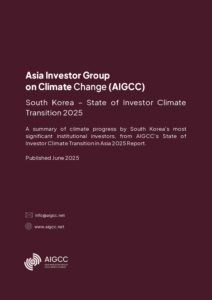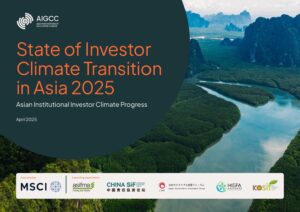Korea’s institutional investors are steadily progressing on climate governance and disclosures, and the integration of climate considerations into their portfolios is becoming mainstream practice.
Korean investors are slightly outperforming the average Asian investor in aligning with international disclosure standards, which also includes disclosure of their physical risks and adaptation actions.
The Asia Investor Group on Climate Change (AIGCC)’s climate metrics assess investors’ performance in managing climate risks and opportunities. The new data covers 18 Korean institutional investors with 2,878 trillion KRW (US$2.1 trillion) in collective AUM.
The data is an exclusive Korea-focussed extract complementing the sixth edition of the Asia Investor Group on Climate Change (AIGCC)’s annual flagship report, ‘The State of Investor Climate Transition in Asia 2025′, which reviews 230 of the most significant and influential investors across Asia.

Download the summary report (English)
AIGCC’s research finds a growing proportion of Korean investors are on par with the overall Asian investor average. However, with Asian investors highly exposed to climate impacts, AIGCC’s research highlights the need for more decisive action to mitigate mounting climate risks, including for Korean investors.
While momentum on climate portfolio integration is progressing across Asia, further ambition from investors is necessary to drive global decarbonisation goals for investors’ best financial interests.
The Korean investor cohort is progressing in several aspects of climate governance and climate disclosures, such as:
- Recognition of Climate Risks/Opportunities. This is gradually becoming mainstream investment practice amongst Korean investors as 78% of investors are now recognising the financial materiality of climate change.
(vs Overall Asia Investor Average of 75%)
- Investment Policies on Climate Integration. 67% of Korean investors have integrated climate considerations into their investment policies.
(vs. Overall Asia Investor Average of 66%)
- Disclosure of Physical Risks/Adaptation Actions. 44% of South Korean investors have disclosed results of portfolio physical risk assessments, though actions to build resilience and adaptation to climate risks remain nascent.
(vs. Overall Asia Investor Average of 43%)
- Publication of ISSB/TCFD-related Disclosures. 50% of Korean investors are now publishing disclosures that are aligned with international standards.
(vs Overall Asia Investor Average of 39%)
Additionally, AIGCC has identified key areas for Korean investors to prioritise in their climate transition journey, including corporate engagement, climate investment, and policy advocacy.
These areas present opportunities particularly for Korean asset owners to take the lead through more progressive asset management mandates for fund managers:
- Climate transition plans – Only a quarter (23%) of Korean investors have developed a transition plan, which entails forward-looking actions to decarbonise portfolios and invest in climate solutions.
(vs. Overall Asia Investor Average of 35%).
- Near term climate targets. Only 22% of Korea’s investors have set near term climate goals (for example, 2030 or 2035 emissions reduction targets). Setting robust interim targets form the basis for investor transition plans and near-term strategies.
(vs. Overall Asia Investor Average of 36%)
- Internal policies on, or approaches to, high-impact areas, including fossil fuels and nature/deforestation. Korean investors do not yet appear to have adopted climate policies or approaches on fossil fuels or other high-emitting sectors.
- Overall climate stewardship and corporate engagement. The majority of Korean investors are not evidencing sufficient climate stewardship and active ownership actions, including disclosing climate engagement targets.
- Transparency and support of government climate policies. Even though Korean investors view climate policy advocacy as an important tool to deliver the best outcomes for their beneficiaries, they do not yet publicly disclose support or actions relating to climate policy advocacy and related engagements.
AIGCC CEO, Rebecca Mikula-Wright said: “It is encouraging to see more Korean investors recognise the financial materiality of climate risks. We now need to mobilise this into action. While 44% of South Korean investors have disclosed results of portfolio physical risk assessments, responses to build resilience to mounting climate risks are nascent.
“There are immense economic benefits and opportunities behind investing in climate adaptation and resilience measures, such as improved urban planning and flood management. There are opportunities for investors who allocate their capital towards climate resilience solutions.
“Private capital is essential and available to move the needle on Korea’s energy transition towards a low-carbon economy, and it is not something governments can or need to do alone. We encourage a more open channel between Korean investors and the government – especially through working with an investor network like AIGCC, where investor voices are channelled effectively to policymakers.”
Chair of Council on Fiduciary, National Pension Fund Management Committee, Chong-Hyun Won said: “The overall vision and journey for investors to achieve net-zero is clear but we now need to get more granular with implementation of concrete and actionable plans.
“It will be an ongoing conversation between investors, policymakers, businesses and organisations like AIGCC on how we can create feasible pathways to achieve the net zero goals we are aiming for, in compliance with the principles outlined in the Paris Agreement.”
AIGCC and MSCI delivered an in-depth investor briefing held in-person in Seoul, South Korea, on Friday, 4 July 2025, focussing on data from AIGCC’s flagship report, State of Investor Climate Transition in Asia and the performance of Korean investors.
This was followed by a panel discussion moderated by Dr. Daehyun Cho, Korea Program Manager, AIGCC, featuring Monica Bae, Director, Investor Practice, AIGCC; Chong-Hyun Won, Chair of Council on Fiduciary, National Pension Fund Management Committee; Yonghwan Choi, Head of ESG Research, NH-Amundi Asset Management; SK Kim, Sustainability & Climate R&D, MSCI; and Taehan Kim, Principal Researcher, Korea Sustainability Investing Forum (KoSIF).
AIGCC’s ‘The State of Investor Climate Transition in Asia’ report is the most comprehensive and reliable snapshot of how decision-makers in the region’s capital markets are managing climate and nature; perhaps the biggest factors influencing the region’s long-term economic development.

Access the full report here